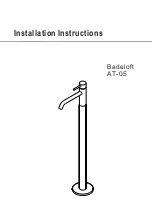
32
Tungsten Electrodes
Tungsten is a rare metallic element used for manufacturing TIG welding electrodes. The TIG process relies on tung-
sten’s hardness and high-temperature resistance to carry the welding current to the arc. Tungsten has the highest
melting point of any metal, 3,410 degrees Celsius.
Tungsten electrodes are nonconsumable and come in a variety of sizes, they are made from pure tungsten or an al-
loy of tungsten and other rare earth elements. Choosing the correct tungsten depends on the material being welded,
the amount of amps required and whether you are using AC or DC welding current.
Tungsten electrodes are colour-coded at the end for easy identification.
Below are the most commonly used tungsten electrodes found in the New Zealand and Australian market.
Thoriated
Thoriated tungsten electrodes (AWS classification EWTh-2) contain a minimum of 97.30 percent tungsten and 1.70
to 2.20 percent thorium and are called 2 percent thoriated. They are the most commonly used electrodes today and
are preferred for their longevity and ease of use. Thorium increases the electron emission qualities of the electrode,
which improves arc starts and allows for a higher current-carrying capacity. This electrode operates far below its melt-
ing temperature, which results in a considerably lower rate of consumption and eliminates arc wandering for greater
stability. Compared with other electrodes, thoriated electrodes deposit less tungsten into the weld puddle, so they
cause less weld contamination.
Thorium however is a low-level radioactive hazard and many users have switched to other alternatives. Regard-
ing the radioactivity, thorium is an alpha emitter but when it is enclosed in a tungsten matrix the risks are negligible.
Thus holding a stick of Thoriated tungsten in your hand should not pose a great threat unless a welder has open cuts
on their skin. Thoriated tungsten should not get in contact with open cuts or wounds. The more significant danger
to welders can occur when thorium oxide gets into the lungs. This can happen from the exposure to vapours during
welding or from ingestion of material/dust in the grinding of the tungsten. Follow the manufacturer’s warnings, instruc-
tions, and the Material Safety Data Sheet (MSDS) for its use.
Ceriated (Color Code: Orange)
Ceriated tungsten electrodes (AWS classification EWCe-2) contain a minimum of 97.30 percent tungsten and 1.80 to
2.20 percent cerium and are referred to as 2 percent ceriated. Ceriated tungstens perform best in DC welding at low
current settings. They have excellent arc starts at low amperages and become popular in such applications as orbital
tube welding, thin sheet metal work. They are best used to weld carbon steel, stainless steel, nickel alloys, and
titanium, and in some cases it can replace 2 percent thoriated electrodes. Ceriated tungsten is best suited for lower
amperages it should last longer than Thoriated tungsten higher amperage applications are best left to Thoriated or
Lanthanated tungsten.
Lanthanated (Color Code: Gold)
Lanthanated tungsten electrodes (AWS classification EWLa-1.5) contain a minimum of 97.80 percent tungsten and
1.30 percent to 1.70 percent lanthanum, and are known as 1.5 percent lanthanated. These electrodes have excellent
arc starting, a low burn off rate, good arc stability, and excellent re-ignition characteristics. Lanthanated tungstens
also share the conductivity characteristics of 2 percent thoriated tungsten. Lanthanated tungsten electrodes are ideal
if you want to optimise your welding capabilities. They work well on AC or DC electrode negative with a pointed end,
or they can be balled for use with AC sine wave power sources. Lanthanated tungsten maintains a sharpened point
well, which is an advantage for welding steel and stainless steel on DC or AC from square wave power sources.
Zirconiated (Color Code: White)
Zirconiated tungsten electrodes (AWS classification EWZr-1) contain a minimum of 99.10 percent tungsten and 0.15
to 0.40 percent zirconium. Most commonly used for AC welding Zirconiated tungsten produces a very stable arc and
is resistant to tungsten spitting. It is ideal for AC welding because it retains a balled tip and has a high resistance to
contamination. Its current-carrying capacity is equal to or greater than that of thoriated tungsten. Zirconiated tungsten
is not recommended for DC welding.
Tungsten Electrodes Rating for Welding Currents
Tungsten
DC Current Amps
AC Current Amps
AC Current Amps
Diameter
Torch Negative
Un-Balanced Wave
Balanced Wave
mm
2% Thoriated
0.8% Zirconiated
0.8% Zirconiated
1.0mm
15 - 80
15 - 80
20 - 60
1.6mm
70 -150
70 - 150
60 - 120
2.4mm
150- 250
140 - 235
100 - 180
3.2mm
250 - 400
225 - 325
160 - 250
4.0mm
400 - 500
300 - 400
200 - 320
















































